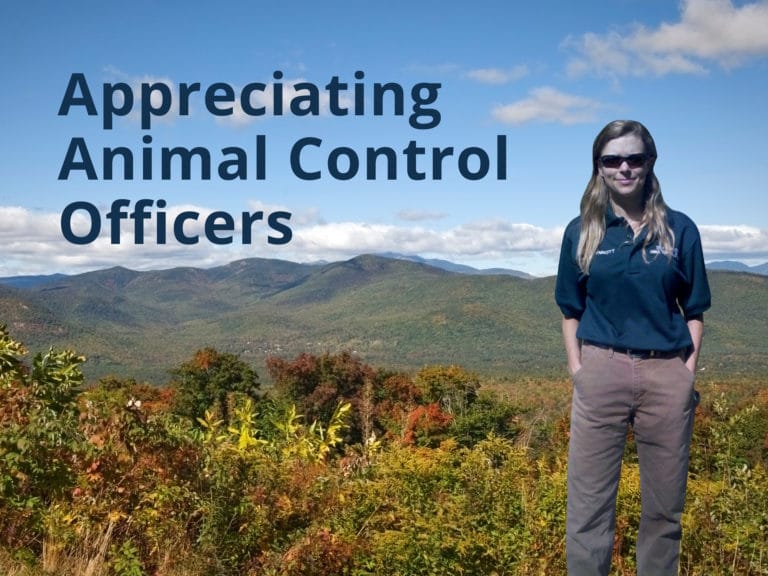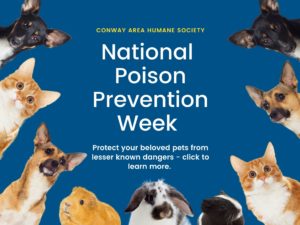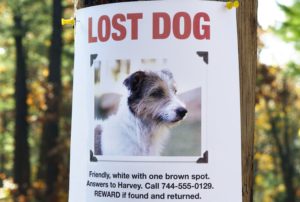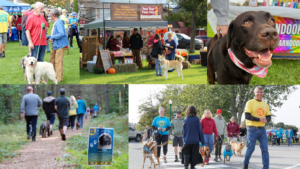If you love animals and are a lifelong learner, appreciate variety, thrive on challenge and live to tell adventurous tales, being an animal control officer (ACO) might be the career for you. In honor of National Animal Control Officer Appreciation Week, CAHS interviewed former animal control officer Lauren Orsini to better understand and appreciate this unique role in our community. Lauren was the ACO for the Town of Jackson from 2012-2016.
Lauren Orsini is known throughout the Mount Washington Valley community as a strong advocate for animals. Her love of animals began in childhood, despite both of her parents not being animal lovers. “The majority of people are born loving animals, but sometimes lack an outlet to express that.”
Not having such an outlet was what sparked Lauren’s involvement in coordinating volunteers at Conway Area Humane Society, and her support of its Junior Board. The Junior Board program allows young adults the opportunity to give input about shelter operations, teach other children in the community about compassion and animal welfare, and gain hands-on experience with our adoptable animals and being part of a nonprofit board.
In addition to her love of animals and very extensive experience working with them, a couple of unfortunate events that happened with Lauren’s own dogs caused her to look into becoming an ACO. About 12 years ago, her dog named Hobbit had just had surgery, in addition to having both arthritis and cancer. In other words, he was in considerable pain. Lauren’s young daughter accidentally stepped on Hobbit’s foot and then fell on him, which caused the dog to bite. This was a traumatic experience that necessitated stitches and later a surgery in her daughter’s head, and taught Lauren an important lesson.
“We always think of ACO’s as protecting animals from humans. Unfortunately, ACO’s also have to protect humans from animals and know how to handle when a person is injured.” ACO’s also sometimes need to protect animals from other animals. The next thing that happened that showed Lauren she was meant to be an ACO was that one of her other dogs got her foot very badly jammed between the license plate and the bumper of her truck when jumping out of it. Lauren was struck as to how calm and resourceful she was during that very stressful situation, so she decided it was time to inquire about the need for an ACO in her town.
ACO’s need to be skilled at handling animals of all types – companion animals, farm animals and wild animals. They should also have strong people skills and be vaccinated for rabies. ACO’s in NH are not required to be certified or to be sworn police officers, but Lauren chose to do both. She got special permission to do the State of Maine’s ACO certification program, since NH didn’t have one, and she also attended the NH’s police academy for part time police officers. She also did a week-long ACO program at UNH and did many other optional trainings through NH Fish and Game and other organizations. Being a self-motivated learner was the name of the game – fortunately, it was a responsibility she took seriously.
So what does an animal control officer do? In short, everything. In Jackson, Lauren coordinated with Fish and Game to conduct animal trappings. She also scared off bears, coerced escaped farm animals back to their owner’s property, and caught rabid animals, such as foxes. She transported all confiscated animals in her personal vehicle. All of this work required knowledge of specific animal behavior and handling techniques, which necessitated even more training. “You’d think the most aggressive animal I encountered would be a bear,” Lauren quipped. “In my experience as an officer, it was actually a crazed beaver. I did, however, have some very close calls with bears as well.”
Lauren worked with pets as well as an ACO. Animal control officers respond to biting incidents, break up dog fights, find and capture strays, investigate animal cruelty cases and confiscate animals in danger. In these instances, problem solving skills and bite gloves are equally important.
“It can be a challenging job,” Lauren remarks, “but it is never dull and is very rewarding.” The job required her to be on call 24 hours a day, 365 days a year, but she only got paid only for the time she spent on actual calls. “It was certainly not something I did for the money,” Lauren noted.
Despite low pay, the challenge, excitement and opportunity to help both animals and people of the career kept Lauren hooked. Stay tuned for our next article in this monthly series which shares two of Lauren’s fondest memories while on duty.








